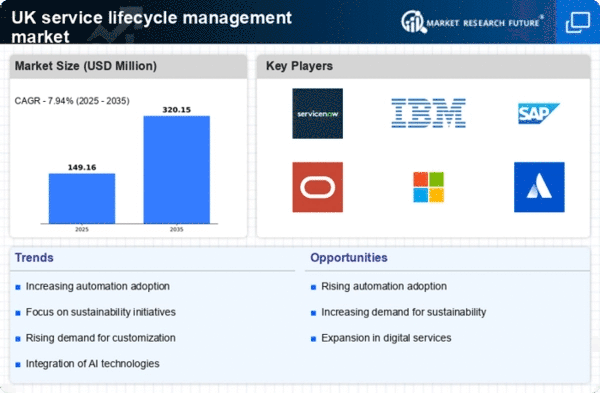Focus on Cost Efficiency
Cost efficiency remains a critical driver in the service lifecycle-management market, particularly in the UK. Organizations are under constant pressure to optimize their operational costs while maintaining high service quality. This focus on cost reduction is prompting businesses to adopt service lifecycle-management solutions that can automate processes and reduce manual intervention. By leveraging these solutions, companies can achieve significant savings, with estimates suggesting potential reductions in operational costs by up to 25%. As a result, the service lifecycle-management market is likely to expand as more organizations prioritize cost-effective service delivery models.
Regulatory Compliance and Standards
The service lifecycle-management market is significantly influenced by the evolving landscape of regulatory compliance and industry standards. In the UK, businesses are required to adhere to various regulations, including data protection laws and service quality standards. Compliance with these regulations not only mitigates risks but also enhances the credibility of service providers. The increasing focus on compliance is expected to drive investments in service lifecycle-management solutions, as companies seek to ensure adherence to legal requirements. This trend may lead to a market growth rate of around 15% over the next few years, as organizations prioritize compliance in their service management strategies.
Emphasis on Data-Driven Decision Making
The service lifecycle-management market is increasingly shaped by the emphasis on data-driven decision making. In the UK, organizations are recognizing the value of data analytics in enhancing service delivery and customer satisfaction. By harnessing data insights, businesses can make informed decisions that improve service quality and operational efficiency. This trend is likely to drive the adoption of advanced analytics tools within the service lifecycle-management market, with projections indicating a growth rate of around 18% in the next few years. The ability to leverage data effectively is becoming a key differentiator for companies aiming to excel in service management.
Growing Demand for Integrated Solutions
The service lifecycle-management market is witnessing a growing demand for integrated solutions that offer comprehensive service management capabilities. Businesses in the UK are increasingly seeking platforms that can seamlessly integrate various service functions, from planning and delivery to monitoring and evaluation. This trend is driven by the need for improved operational efficiency and enhanced customer experiences. As organizations recognize the benefits of integrated solutions, the market is expected to see a surge in adoption rates, potentially increasing by 20% in the coming years. This shift indicates a clear preference for holistic approaches to service management, which can streamline processes and reduce operational silos.
Technological Advancements in Service Management
The service lifecycle-management market is experiencing a notable shift due to rapid technological advancements. Innovations such as artificial intelligence (AI), machine learning, and the Internet of Things (IoT) are transforming service delivery processes. These technologies enable businesses to automate routine tasks, enhance decision-making, and improve customer interactions. In the UK, the adoption of AI in service management is projected to grow by approximately 30% over the next five years. This growth indicates a strong inclination towards leveraging technology to streamline operations and enhance service quality. As companies increasingly invest in these technologies, the service lifecycle-management market is likely to expand, driven by the need for efficiency and improved customer satisfaction.
















